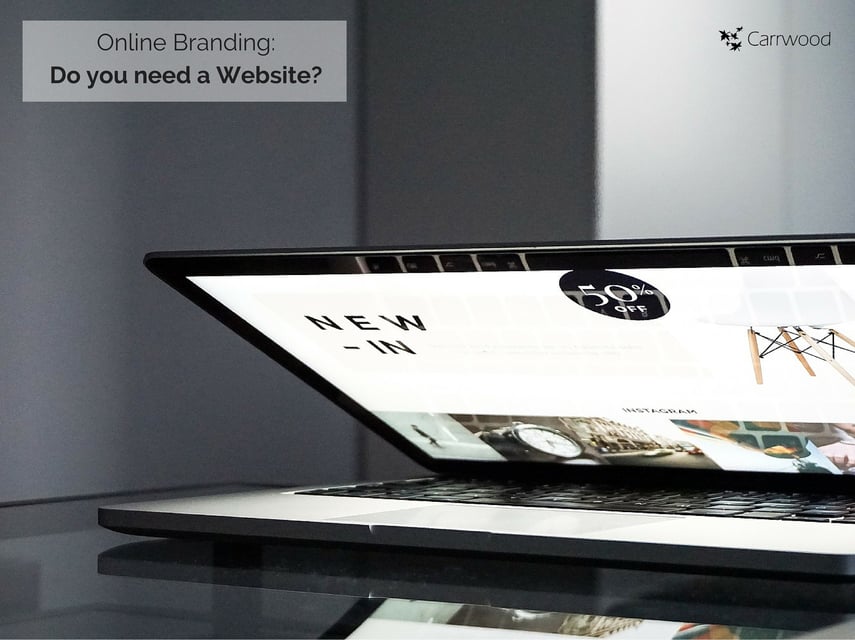
Did you know that in 2015, consumers were set to spend an average £1,174 shopping online, a 9.6 percent rise on 2014? A study conducted by RetailMeNot, the parent company of Vouchercodes.co.uk, observed that British online retailers will experience a 16.2 percent year-on-year sales spike in 2015 to reach a staggering £52.3 billion. With more and more of us reaching to the geographically boundary-free world of the internet to do our shopping, read reviews, read the news, book flights, watch television, download music, chat to friends, conduct business, and the myriad of other tasks you can carry out conveniently and leisurely online, it stands to reason that every business needs a website, right? Not necessarily.
In the final part of this series we will ask do you even need a website? It sounds controversial but in our last article about consistency across the web we listed a host of channels that any business seeking success is likely to need setting up and populating. That takes time - a lot more time that you think. So before you rush to add your website to the to do list it’s good to take a moment and ask do you really need one?
It sounds shocking doesn’t it? and depending on your industry it might be a non-starter, but more and more often I’m sitting down with SME’s, who think their websites are doing well and bringing in new business, but when I look at the analytics it tells a different story.
‘What? you mean they are not reading the lengthy pages of copy and images that I have painstakingly prepared’ No, sorry.
Google is more than a Search Engine
Google is changing and more and more information is being served to the searcher in the Google results page rather than requiring another click to a website. Try searching for trains from one city to another and the results appear right there in front of you in the search results. Now try finding out the exchange rate for ‘$500’ - same results again.
So for the business above if they allow their contact details to be served in the search results then do they even need a website? It’s this realisation that can save a business a lot of money (and time) - especially when starting up.
Still think you need a Website?
Maybe not having a web presence is too radical for you, and I can understand why you feel this way. However, if you’re planning on a new or update to your existing website then take this opportunity to at least simplify your website requirements and consider that every page needs a purpose, this approach alone will save you time and money.
Look at the Analytics
If you already have a site then take a look at the analytics to help you figure out and learn more about how people are using your site.
Analytics is the data to show how people are using your website. Google analytics is a free tool - hopefully you know exactly what this is and your using it - if not and you have a website get it installed ASAP.
When you start to look at this data you can learn so much. It can inform you about where your visitors are coming from:
- Organic - being found in search engines
- Direct - people typing the URL in the browser
- Social - people coming from your social media channels
- Paid - visitors that have clicked a link or adverts that you have paid for.
Organic and Direct
Let’s concentrate on the first two in that list, organic is actually direct. Organic is usually the biggest driver of traffic, therefore the business owner often thinks that their website is vital for them and doing really well in search.
However when we look into it further the organic traffic that is coming to the site is mainly searching for the business name, which isn’t actually organic traffic as such, but direct traffic. We are changing the way we use browsers and Google and co are playing a massive factor in this. Just typing a name in the url area causes a search. For example, I visit the BBC website probably every day and yet I still search in google ‘BBC’. And I’m not alone in doing this as the stats show.
Pages being Viewed
If we take a closer look at the pages actually being viewed chances are you will fall into the category of most non-ecommerce websites where actually the pages being viewed are the homepage, the about us page (or pricing page) and then the contact us page, and that’s if your website is working for you.
This tells me, and the business owners, that all the visitor is wanting is to find out how to contact your business. More than that the the visitor is actually finding the website by searching the business name - hence the website isn’t actually attracting new customers - but just helping those who already know you.
How do you use the Web?
If you go through the same process as above - don’t worry. Like the preferred end of any relationship, ‘it’s not you it’s them’. Things have changed. Search is still changing. If you think about how you are using the web you are probably changing too. Excluding buying a product online - when was the last time you spent any time on the website of a business you want something from - price, trust, contact and you’re done!
Ensure your Website doesn't encourage people to leave as soon as they've clicked on it!
It’s all very well saying if a website doesn’t appear on page one of Google it might not well exist, but if it is bursting with elements that make visitors leave in a hurry before they have even had a chance to digest what the site is all about, you may as well not have one, right?
There are plenty of reasons people hastily leave a website, such as being bombarded with highly annoying auto-sound that can drive us nuts, being faced with popups – the sooner we see them the sooner we leave -, slow load times, if it doesn’t load up almost instantly, the impatient digital generation are likely to look elsewhere! And finally, if a website is difficult to navigate, prioritises ads over content, is laden with typos and poorly written content, and is cluttered with cookies, ask yourself – if people are likely to leave it no sooner have they arrived, is it really worth the bother of having a website in the first place?
Key points to consider
So if at this point you still strongly believe that you need a website then please at least take the following from reading this article:
- Get something that meets your needs, as less is more
- Evolve it along with your business over time.
- Ensure it is designed and written to a high quality and does not include any annoying traits that make visitors hurriedly click on the cross to get rid of it!
I’m a digital marketing consultant and I’m yet to sort my own website out - a bit like a plumber with a leaky tap at home - however I don’t need more clients right now - but in the future I will and my website could be vital - I too will fall into the trap of over thinking it, over engineering it and I will most probably end up with something taking much longer and costing much more than what I actually needed.
I will make a note now to re-read this again when I come to the planning stage.
Thanks for listening, I hope you found this useful. If you missed any of my other blogs in this series read them here…
One Voice: Consistency of your branding online
The Impact of branding in Business: Colours and Symbols
Creating a brand within a budget: Professional doesn't always mean expensive
About the author:
Simon McCaskill is a digital marketing specialist and the bear behind ‘Bear and Fly’. Simon also works for Google as part of their dedicated digital outreach team.
Digital marketing can be confusing and frustrating and it shouldn’t be. Bear and Fly’s approach is all about working with you, the client, taking you step by step through the processes so you feel more comfortable in how you are marketing your business online.
@bearflydigital linkedin.com/in/simonmccaskill

